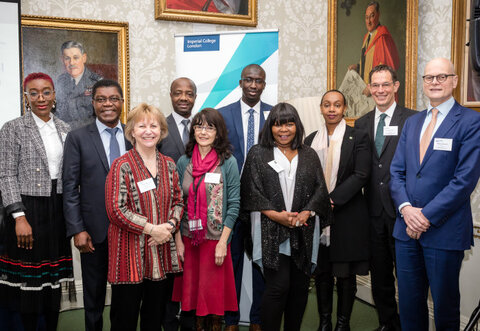Imperial and AIMS launch partnership to train future African science leaders

By Stephen Johns for Imperial College London
A major partnership between Imperial and the African Institute of Mathematics Sciences (AIMS) will train the next generation of African scientists.
AIMS is a pan-African network of Centres of Excellence for post-graduate training, research and public engagement in mathematical sciences.
It currently has Centres in South Africa, Senegal, Ghana, Rwanda and Cameroon, which focus on post-graduate training, research and public engagement. Their work focuses on areas such as data analysis, computer and programming skills, and epidemiology.
The partnership with Imperial will:
- enable new research collaborations to emerge between Imperial academics and leading African scientists
- help train and develop the next generation of scientists in Africa
- support Imperial academics to spend time working at AIMS Centres
Speaking at the launch of the partnership, Imperial’s Vice President Maggie Dallman said: “Imperial is thrilled to have the opportunity to be a part of the AIMS vision.
“There are already a number of existing links between the College and AIMS centres and we hope that the partnership will enable us to strengthen these links and increase the number of equitable collaborations between Imperial academics and scientists across Africa.
“Imperial is a global university with a wide spread of international engagement and impact. Just last week Imperial was recognised by Times Higher Education as the UK’s most international university.
“We recognise that, to continue having as broad a benefit to society as possible, expanded collaboration with the Sub-Saharan Africa region is incredibly important."
Scientific transformation in Africa
The launch event was attended by representatives from the Embassies of South Africa, Ghana, Rwanda, Senegal and Cameroon.
President and CEO of AIMS, Professor Thierry Zoumahoun, spoke about the vision for the institution, which is currently leading a technological and scientific transformation on the continent.
Professor Zoumahoun said: “We want to ensure that the scientists coming out of AIMS are leaders. We must equip them with the leadership skills they need in addition to the scientific skills, so they are well rounded scientists who can navigate through the complex library of transformation in Africa.
“Our vision is to build a better Africa through innovative education, training, entrepreneurship and research. Our mission is to empower the brightest young African scientists and innovators of today, to become creative entrepreneurs and leaders of tomorrow in their fields of endeavour.
“AIMS is the biggest pan-African network in mathematical sciences and Imperial has a track record in building links with industry so there is much we can learn from each other.”
Bringing the continent together through science
The founder of AIMS and Imperial alumnus, Professor Neil Turok, said: “Science originated in Africa and now it should return - it must come back to Africa.
"Africa is the continent of the century and the future. The fuel for science is young people and a lot of them are in Africa.
“Science allows us to understand the world, which enhances our appreciation but enables us to improve the world. And science is driven by youth and diversity.
“We want to bring the continent together through science and maths, using it as a bridge between countries.”
Until last year Professor Turok was the Director of the Perimeter Institute for Theoretical Physics in Canada, and was recently appointed the inaugural Higgs Chair of Theoretical Physics at the University of Edinburgh.
Public health in Cameroon
Professor Maria-Gloria Basanez, Dr Ellie Sherrard-Smith and Dr Nathan Green from the School of Public Health, have just started a project with AIMS Cameroon to deliver a public health course online to 34 students from 11 countries.
The course, An Introduction to Dynamic Models of Infectious Diseases, concentrates on crucial public health problems for Cameroon such as Malaria and Filariases.
Professor Basanez said: “I am passionate about teaching and capacity building in Africa and empowering young scientists to think for themselves to do cutting edge research and communicate it well it well nationally and internationally.”
“The partnership with AIMS brings benefits to both sides. The students are inquisitive and enthusiastic, bring new ideas, ask questions and challenge assumptions, which injects life into our mathematical endeavours.
“It is allowing us to engage and empower partners there to jointly make a direct impact in public health, how to use and apply modelling in situations and challenges that African countries are facing.”
Imperial and AIMS connections
In 2018 former Imperial academic, Dr Marc Deisenroth, undertook a 4-month sabbatical at AIMS Rwanda, teaching and developing a course on the Foundations of Machine Learning.
He also supervised student’s dissertations at AIMS Senegal and taught on a short course at AIMS South Africa.
The former head of AIMS Ghana, the late Professor Francis Allotey, was an Imperial alumnus.
Professor Vincent Savolainen, from the Department of Life Sciences, has been a visiting professor at AIMS Ghana.